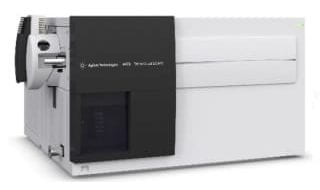Instrument Hub
Similar Instruments
Overview
The Agilent 6460 Triple Quadrupole LCMS combines the separation power of HPLC with the detection power (i.e. sensitivity and selectivity) of a triple quadrupole instrument for targeted analysis of small molecules in complex samples. The Agilent Jet Stream technology uses super-heated nitrogen to improve ion generation and desolvation, which leads to greater signal and reduced noise.
Fast multiple reaction monitoring (MRM) speeds allow for analysis of over 100 overlapping compounds in a given retention time window. Triggered MRM (tMRM) combines fast and sensitive MRM quantitation with the generation of a product ion spectrum for library searching and compound screening and confirmation.
Features
-
-
- Mass Range: 5-2,000 m/z
- Mass Resolution: 0.7 amu (FWHM)
- Ionization Sources: ESI
-
Software
Analysis for the Agilent 6460 Triple Quadrupole LCMS is supported by:
- MassHunter
- NIST08
- AMDIS
Access to the software is available on the Small molecules Virtual Machine.
Support
Email Githal Arachchige for all enquiries related to the Agilent 6460 Triple Quadrupole LCMS.
Considerations
Chromatography columns are not provided, users need to bring their own column to use this instrument.
Limitations
This is a low-resolution mass spec instrument with an m/z range up to 2,000.
Cost
The cost varies depending on task and support level required. Current user costs are listed in iLab booking system.
Eligibility
Available for postgraduate students, doctoral candidates and staff of the University of Auckland.
Access Requirements
The Agilent 6460 Triple Quadrupole LCMS is housed on the Main Campus in the School of Chemical Sciences.
Training
Training is provided for users until they are competent to use the instrument independently. Contact Githal Arachchige to arrange training.
Booking
Users can book the Agilent 6460 Triple Quadrupole LCMS through Auckland Science Analytical Services (ASAS) iLab booking system. Users and their principal investigators or research group need to first have accounts in the iLab booking system. Instructions, details and FAQs on how to sign up to iLab can be found on the ASAS website.

